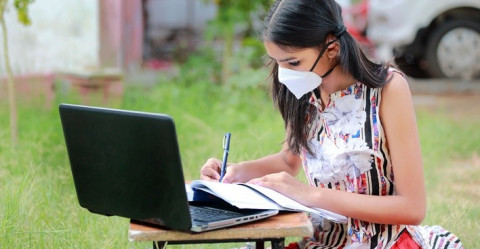
GCED Basic Search Form
Quick Search
أنت هنا
الأخبار

Set against the backdrop of the COVID-19 education disruption and response, UNESCO’s flagship digital technologies in education event (formerly named Mobile Learning Week, 12-14 October 2020) highlighted innovations for technology-enabled futures of learning. Held virtually for the first time, the three-day event, under this year’s theme of ‘Beyond Disruption: Technology Enabled Learning Futures’ started the first day with sharing distance learning policies and evaluating effectiveness, followed by showcasing innovative solutions throughout the second day, and concluded on the third day with setting out policy and research agendas to build back better.
Organized in partnership with the International Telecommunication Union and in collaboration with Ericsson, GIZ, Huawei, Microsoft, Norad, and ProFuturo amidst the largest education disruption in history due to the COVID-19 pandemic, this year’s conference focused on distance learning solutions to build back better. It examined the medium and long-term implications of the learning crisis that forced 1.6 billion learners worldwide out of the classroom, and the challenges that lie ahead. The event also shared best practices and explored innovative solutions to resolve this crisis.
“Technology and connectivity are integral to building more resilient, flexible, and open systems,” said Stefania Giannini during the Opening Ceremony. “Let us together define how to use technology to help meet the enormous challenge before us inclusively and fairly. What we do need now is another evaluation of what didn’t work”.
Effective policies – sharing policies and evaluating effectiveness
After months of large-scale experimentation with distance learning, panel discussions with high-level representatives of UN agencies, ministers, and experts attempted to draw specific forward-looking policy advice. The first day featured a ministerial level panel to present various country-level responses. Ministers of Education from Côte d'Ivoire, Egypt, Ethiopia, Finland, and South Sudan recounted their national efforts to provision distance learning at unprecedented speed and scale.
“Exceptional times require flexible measures and a lot of creativity by teachers,” said Li Andersson, Finland’s Minister of Education. “While the ability of teachers to transfer teaching online proved even better than had been expected, it is clear that distance learning can never fully replace the physical classrooms. Schools are much more than places for learning. They provide social networks, safety and well-being for children and youth.”
Gabriel Changson Chang, South Sudanese Minister of Higher Education, Science and Technology stated, “technology-enabled learning futures can help shape the future of South Sudan’s higher education opportunities. The Republic of South Sudan hopes to draw lessons from a range of education responses during COVID-19 to inform the planning of technology-enabled inclusive and resilient learning systems for the future.”
Innovative solutions – showcasing innovative distance learning solutions
The second day of the conference showcased solutions from sponsors and members of the Global Education Coalition, and featured exhibitions from technology providers. One highlight was the EduTech keynote session focusing on the Khan Academy, whose Founder, Salman Khan, shared his experience during the pandemic in creating online educational tools, “the digital divide is the number one headline of COVID-19. What we are trying to do is to build for the rebuilding phase.” Barbara Holzapfel, Vice President of Microsoft Education, contributed to the day’s discussion by stating, “COVID-19 has accelerated the transformation [in education] that was well underway and we’ve seen years’ worth of change in just a matter of weeks. On the other side, the acceleration of change also brings an opportunity to reimagine the future of education and chart a path that is inclusive for all students around the world. “
The future – setting out policy and research agendas to build back better
The conference concluded with the exploration of how education systems can emerge from the crisis stronger and more resilient to future disruptions. Sessions highlighted successful policy interventions in India and Finland, solutions to build back more gender-equal education systems, and innovations to digitize educational content and pedagogy. The event concluded on a positive note with a High-Level Panel outlining the way forward in the presence of the Minister of Education from Ecuador. She put forward the importance of the “flexibility of the education system” in addressing gaps and inequality in education, “in order to respond to the different situations”. She was joined by key representatives from UNESCO, Dubai Cares, ITU, the World Bank, UNICEF, ProFuturo Foundation, and the Southeast Asian Ministers of Education Organization (SEAMEO).
In her closing remarks, the Assistant Director General for Education Stefania Giannini underlined: “Change is possible. Education is a promise to provide an equal chance to students for education. However, the way to address inequalities is still a challenge.”
Resources
- Videos, presentations, agenda, speakers’ bio and more resources available at https://mlw2020.org/#/home
- Six months into a crisis: Reflections on international efforts to harness technology to maintain the continuity of learning
URL:
https://en.unesco.org/news/beyond-disruption-digital-learning-during-covid-19-pandemic
